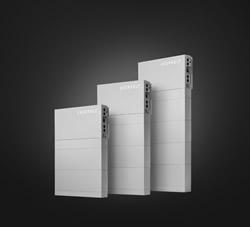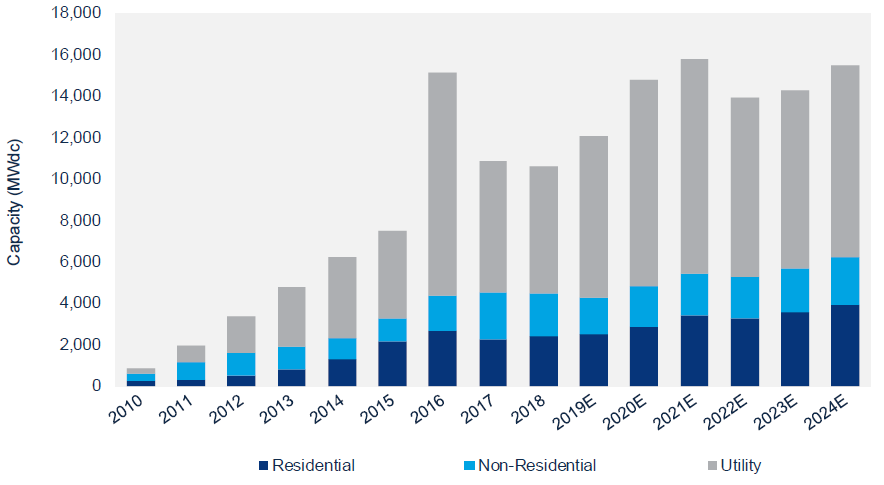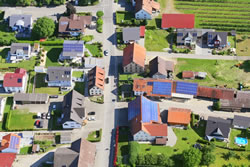The Net Zero Home
Run solely on renewable energy sources, every aspect of the home's design was calculated to conserve energy and capture as much of the sun's energy for heat in the winter and cooling in the summer.
The Three Major Methods of Designing a Rooftop Solar System
During the sales and planning phases of a residential rooftop solar project, different methods are used to figure out how to lay out the solar modules on a roof. We will talk about three methods that solar professionals often use during this phase.
Solar Energy Powers 'Home of the Future'
Located in Memphis on the banks of the Mississippi River, the civitas home project is a 2,800-square-foot residence that aims to be one of the first homes in America to be certified Zero Emissions, Zero Energy, and Reveal, along with attaining LEED Platinum certification.
New Survey Reveals 70% of Americans Support Nationwide Solar Panel Mandate on New Homes
Among those who support a nationwide solar mandate, 32% said they strongly support it and 38% said they somewhat support it, while approximately 16% said they somewhat oppose it and 14% said they strongly oppose it.
U.S. Solar Market Adds 10.6 GW of PV in 2018, Residential Market Rebounds
The amount was a 2 percent decrease from 2017. However, the forecast shows the market rebounding in the years ahead, according to the newly released U.S. Solar Market Insight 2018 Year-in-Review Report from Wood Mackenzie Power & Renewables and the SEIA.
Trends in the Residential Solar Industry
By storing clean solar power in a battery, people can use that power at night when the sun isnt shining, withstand power outages that are growing in frequency, keep the grid stable during times of high usage, and make 100% renewable, clean energy achievable.
Solar Industry Unveils Campaign to Streamline Solar Permitting
With the support of industry leaders, the Solar Energy Industries Association (SEIA) and The Solar Foundation today are unveiling the Solar Automated Permit Processing (SolarAPP) initiative, which will streamline permitting and slash the cost of solar installations.
Empower Unveils the Genesys 8K™ Modular Smart Home Energy Platform
Technology that streamlines the deployment of residential solar + energy storage without compromise of performance or cost
SolarCity's solar installations crash nearly 40%
Nichola Groom, Reuters: Tesla's SolarCity reported a drop of nearly 40 percent in solar installations for the first quarter on Wednesday, the latest sign of a reversal in fortunes for the once high-flying residential solar industry.
Flower-shaped solar panel follows the sun
Megan Barber for Curbed: Based off the concept of how a sunflower follows the sun, the Smartflower is a portable, adjustable petal system that tracks the suns path throughout the day. When the sun rises in the morning, the Smartflower automatically unfolds and begins producing energy by setting its petals at a ninety-degree angle. The flower goes "back to sleep" into a folding position at night or whenever high winds make it unsafe to operate.
Solar power is contagious. These maps show how it spreads.
Brad Plumer for VOX : Rooftop solar is expanding rapidly in the United States — by some estimates, a new system goes up every four minutes. There are plenty of reasons for that, from falling prices to generous federal subsidies to innovative leasing schemes.
But there's another, little-discussed factor here: Residential solar power is contagious. Yep, contagious. Studies have found that if you install solar photovoltaic panels on your roof, that increases the odds that your neighbors will install their own panels.
SolarCity, the largest solar installer in the United States, just published some fascinating data on this "contagion" effect. The company has installed 230,000 rooftop systems nationwide (often by allowing customers to lease panels rather than buy them upfront). It says fully one-third of customers were referred by a friend or neighbor.
SolarCity has also made some neat animations showing the "contagion" effect in action. View here:
Small-scale solar power growing in the United States
By Daniel J. Graeber for UPI.com: Small-scale solar installations in the United States account for about a third of the overall capacity on the grid, a report from the federal government said.
The U.S. Energy Information Administration estimates total U.S. solar-power output in September, the last full month for which data are available, at 3.5 million megawatt hours. Of that, just more than 30 percent came from small-scale solar installations.
"Generation from roof-top photovoltaic systems has become an increasingly important part of total solar generation in the United States," EIA AdministratorAdam Sieminski said in an emailed statement.
A September report from the Solar Energy Industries Association, with support from green energy market adviser GTM Research, found second quarter residential solar capacity grew 70 percent year-on-year to 473 megawatts. Cont'd...
Are Energy Free Homes Practical?
Energy free residences are not only practical but they are the dwellings of the future. Let's hope that home builders start thinking zero net energy as they design upcoming housing subdivisions.
Mechanical ventilation and heat recovery System with integral heat pump
This article explains: some background to our bungalow design, why we had the original mechanical ventilation and heat recovery system installed; why we chose the latest system and our experience with both systems.
What Size Air Conditioner Do I Need?
Many people mistakenly buy larger air
conditioning units than they need because they believe that a larger unit
will both operate and cool their house more efficiently. In truth, a larger
unit could be less efficient.
Records 1 to 15 of 29
Featured Product

EVERVOLT home battery storage: Dependable power, with or without solar
Whether paired with solar or used independently, the renewable energy stored in an EVERVOLT home battery system serves as a reliable backup against unpredictable utility grid fluctuations and weather-related events. Keep essential appliances running longer and maintain your lifestyle during unforeseen circumstances. Our EVERVOLT battery storage systems are backed by a comprehensive 12-year warranty from Panasonic, including coverage for labor. Learn More about Panasonic EVERVOLT.














.jpg)